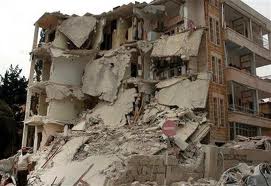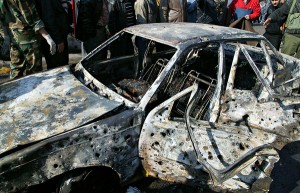 Suicide bombings and sophisticated attacks on key Syrian government sites have stirred fear among some Middle East analysts that Islamic extremist groups are trying to infiltrate the 14-month-old rebellion against Syrian President Bashar Assad.
Suicide bombings and sophisticated attacks on key Syrian government sites have stirred fear among some Middle East analysts that Islamic extremist groups are trying to infiltrate the 14-month-old rebellion against Syrian President Bashar Assad.
Assad has blamed foreign militants for the uprising against him since it began in March 2011, trying to cast his bloody crackdown as part of the broader fight against Islamic terrorists, including Al Qaeda.
Although no direct evidence of Al Qaeda involvement has emerged, some Obama administration officials and Middle East analysts say they have detected the group’s hand in recent attacks. They point to the scale and tactics of recent suicide car bombings in Damascus and to calls by Al Qaeda leaders for Muslim holy warriors to join the fight against Assad.
“We do have intelligence that indicates that there is an Al Qaeda presence in Syria, but frankly we don’t have very good intelligence as to just exactly what their activities are,” U.S. Defense Secretary Leon Panetta said last week in Washington.
In February, Ayman Zawahiri, the elusive Al Qaeda strategist who took the reins of the terrorist network after Osama bin Laden was killed last year, called on Muslims from neighboring countries to flock to Syria to help their embattled brethren topple the Syrian regime.
Though Abrams conceded that it can’t be said with certainty that Al Qaeda is involved, he argued there are compelling signs that foreign Islamic extremists are in Syria on both sides of the conflict.
A little-known militant group calling itself Al Nusra Front has claimed responsibility for bombing Syrian government sites, including the coordinated suicide attacks in Damascus on May 10 that killed 55 people. Al Nusra Front has said its attacks are carried out by fighters returning from battles elsewhere, triggering suspicion of links to Al Qaeda and the insurgency in Iraq.
Rebel leaders in the Free Syrian Army have insisted that they want nothing to do with the terrorist network. But some security analysts contend that Al Qaeda or other extremist groups could take advantage of Syria’s chaos and violence to resume operations in the region.
“Al Qaeda has this historical interest in having a stronger base in the Levant,” Bilal Y. Saab, a Middle East analyst at the Monterey Institute of International Studies, said of the eastern Mediterranean region that spans Syria, Lebanon, Israel, Jordan, the Palestinian territories and parts of Turkey, Egypt and Iraq.
Some argue that the failure of the West to come to the aid of Syria’s outgunned rebels provides an opening for an opportunistic Al Qaeda to infiltrate the disparate forces fighting Assad.
“Given the chaos in Syria over the last year, it’s probable that some radical groups with links to Al Qaeda have made their way into Syria,” said Paul Salem, director of the Carnegie Middle East Center in Beirut. “They’re not being accepted into the communities as a legitimate movement but they are still effective as armed gangs, and maybe some rebels accept it when they go and blow up a Syrian army intelligence building.”
 Salem sees a danger of some rebel factions, desperate for assistance in their fight to oust Assad, cooperating with extremists on the fringes of the Syrian conflict.
Salem sees a danger of some rebel factions, desperate for assistance in their fight to oust Assad, cooperating with extremists on the fringes of the Syrian conflict.
“They do share in some objectives, and Al Qaeda has lethal capacities that some people may be looking for,” Salem said.
Al Qaeda’s influence in the Middle East has eroded over the last decade, damaged by its reckless violence in Iraq that added to the thousands of civilian deaths from the U.S. invasion, occupation and the anti-American insurgency that followed. Al Qaeda was ultimately defeated in Iraq by fellow Sunnis who rose up against them, no longer willing to tolerate the carnage.
In Syria, Al Qaeda may be ideologically drawn to a fight in which the Sunni majority is paying the heaviest price in a conflict that has taken on increasingly sectarian overtones as the killing escalates.
“From their point of view, the battle going on in Syria is against defenseless Sunnis, that no one is helping them,” said Elliott Abrams, a senior national security advisor to President George W. Bush and staunch advocate of more decisive action in the Middle East to contain Iran and Shiite militias.
Though Abrams conceded that it can’t be said with certainty that Al Qaeda is involved, he argued there are compelling signs that foreign Islamic extremists are in Syria on both sides of the conflict.
“They’re attracted like a moth to a flame,” he said. “How many, we don’t know. But it does seem that there are some there, and it does seem to be growing.”
For Abrams and others, the danger lies in withholding aid to the rebels even as they see indications that the Iranian Revolutionary Guard and Shiite Hezbollah fighters from neighboring Lebanon have come to Assad’s side.
“What have we given them? Kofi Annan,” Abrams said disparagingly of the former United Nations chief, a special U.N. and Arab League envoy whose six-point peace plan has failed to halt the Syrian bloodshed.
It is unlikely that more than tightened economic sanctions and moral support is on the way. The Obama administration is in the midst of a reelection campaign, and Americans have tired of bloody, expensive foreign wars and want to focus on economic woes at home. Neither do allies in Europe have the stomach or the money to join a fight that would almost certainly be deadlier and longer than the seven-month campaign last year to oust Libya’s Moammar Kadafi.
“The very sophistication of the attack could tell us this is the work of Al Qaeda, because of the similarity we saw in incidents in Iraq during the occupation,” said Saab of the Monterey Institute. “But it’s still not unthinkable that the Syrian government is behind it. They’ve already killed thousands of their own people.”
Analysts are divided about the effect of adding an Al Qaeda presence to the volatile mix, unsure whether that would dissuade Washington and its allies from more forceful intervention to aid the rebels or encourage it. To avoid a quagmire like Iraq, the Western allies alternately could craft a response like the stepped-up U.S. targeting of an Al Qaeda branch in Yemen with airstrikes.
The rebels have shown an ability to use more sophisticated tactics in recent weeks, a sign of outside expertise, some say. But the advances could be related to the rebels getting better organized after more than a year of battling an enemy with superior firepower.
Even in the attack that most cite as a possible footprint of Al Qaeda, the massive twin car bombings that struck a government intelligence building in the capital last week, many have blamed Assad agents aiming to sow fear of the rebels and shore up support for the regime.
“The very sophistication of the attack could tell us this is the work of Al Qaeda, because of the similarity we saw in incidents in Iraq during the occupation,” said Saab of the Monterey Institute. “But it’s still not unthinkable that the Syrian government is behind it. They’ve already killed thousands of their own people.”
LA Times

Leave a Reply
You must be logged in to post a comment.